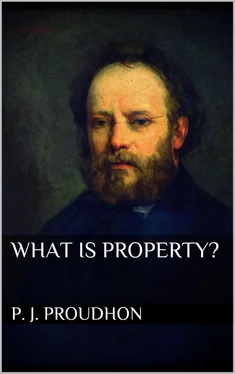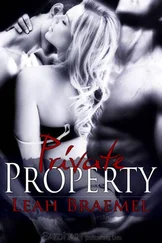But let us look farther:—
"Restrictions of these rights and this duty commence at the time when covenants, either implied or expressed, are agreed upon. Then appears for the first time justice and injustice; that is, the balance between the rights of one and the rights of another, which up to that time were necessarily equal."
Listen: RIGHTS WERE EQUAL; that means that each individual had the right to SATISFY HIS NEEDS WITHOUT REFERENCE TO THE NEEDS OF OTHERS. In other words, that all had the right to injure each other; that there was no right save force and cunning. They injured each other, not only by war and pillage, but also by usurpation and appropriation. Now, in order to abolish this equal right to use force and stratagem,—this equal right to do evil, the sole source of the inequality of benefits and injuries,—they commenced to make COVENANTS EITHER IMPLIED OR EXPRESSED, and established a balance. Then these agreements and this balance were intended to secure to all equal comfort; then, by the law of contradictions, if isolation is the principle of inequality, society must produce equality. The social balance is the equalization of the strong and the weak; for, while they are not equals, they are strangers; they can form no associations,—they live as enemies. Then, if inequality of conditions is a necessary evil, so is isolation, for society and inequality are incompatible with each other. Then, if society is the true condition of man's existence, so is equality also. This conclusion cannot be avoided.
This being so, how is it that, ever since the establishment of this balance, inequality has been on the increase? How is it that justice and isolation always accompany each other? Destutt de Tracy shall reply:—
"NEEDS and MEANS, RIGHTS and DUTIES, are products of the will. If man willed nothing, these would not exist. But to have needs and means, rights and duties, is to HAVE, to POSSESS, something. They are so many kinds of property, using the word in its most general sense: they are things which belong to us."
Shameful equivocation, not justified by the necessity for generalization! The word PROPERTY has two meanings: 1. It designates the quality which makes a thing what it is; the attribute which is peculiar to it, and especially distinguishes it. We use it in this sense when we say THE PROPERTIES OF THE TRIANGLE or of NUMBERS; THE PROPERTY OF THE MAGNET, &c. 2. It expresses the right of absolute control over a thing by a free and intelligent being. It is used in this sense by writers on jurisprudence. Thus, in the phrase, IRON ACQUIRES THE PROPERTY OF A MAGNET, the word PROPERTY does not convey the same idea that it does in this one: I HAVE ACQUIRED THIS MAGNET AS MY PROPERTY . To tell a poor man that he HAS property because he HAS arms and legs,—that the hunger from which he suffers, and his power to sleep in the open air are his property,—is to play upon words, and to add insult to injury.
"The sole basis of the idea of property is the idea of personality. As soon as property is born at all, it is born, of necessity, in all its fulness. As soon as an individual knows HIMSELF,—his moral personality, his capacities of enjoyment, suffering, and action,—he necessarily sees also that this SELF is exclusive proprietor of the body in which it dwells, its organs, their powers, faculties, &c.... Inasmuch as artificial and conventional property exists, there must be natural property also; for nothing can exist in art without its counterpart in Nature."
We ought to admire the honesty and judgment of philosophers! Man has properties; that is, in the first acceptation of the term, faculties. He has property; that is, in its second acceptation, the right of domain. He has, then, the property of the property of being proprietor. How ashamed I should be to notice such foolishness, were I here considering only the authority of Destutt de Tracy! But the entire human race, since the origination of society and language, when metaphysics and dialectics were first born, has been guilty of this puerile confusion of thought. All which man could call his own was identified in his mind with his person. He considered it as his property, his wealth; a part of himself, a member of his body, a faculty of his mind. The possession of things was likened to property in the powers of the body and mind; and on this false analogy was based the right of property,—THE IMITATION OF NATURE BY ART, as Destutt de Tracy so elegantly puts it.
But why did not this ideologist perceive that man is not proprietor even of his own faculties? Man has powers, attributes, capacities; they are given him by Nature that he may live, learn, and love: he does not own them, but has only the use of them; and he can make no use of them that does not harmonize with Nature's laws. If he had absolute mastery over his faculties, he could avoid hunger and cold; he could eat unstintedly, and walk through fire; he could move mountains, walk a hundred leagues in a minute, cure without medicines and by the sole force of his will, and could make himself immortal. He could say, "I wish to produce," and his tasks would be finished with the words; he could say. "I wish to know," and he would know; "I love," and he would enjoy. What then? Man is not master of himself, but may be of his surroundings. Let him use the wealth of Nature, since he can live only by its use; but let him abandon his pretensions to the title of proprietor, and remember that he is called so only metaphorically.
To sum up: Destutt de Tracy classes together the external PRODUCTIONS of nature and art, and the POWERS or FACULTIES of man, making both of them species of property; and upon this equivocation he hopes to establish, so firmly that it can never be disturbed, the right of property. But of these different kinds of property some are INNATE, as memory, imagination, strength, and beauty; while others are ACQUIRED, as land, water, and forests. In the state of Nature or isolation, the strongest and most skilful (that is, those best provided with innate property) stand the best chance of obtaining acquired property. Now, it is to prevent this encroachment and the war which results therefrom, that a balance (justice) has been employed, and covenants (implied or expressed) agreed upon: it is to correct, as far as possible, inequality of innate property by equality of acquired property. As long as the division remains unequal, so long the partners remain enemies; and it is the purpose of the covenants to reform this state of things. Thus we have, on the one hand, isolation, inequality, enmity, war, robbery, murder; on the other, society, equality, fraternity, peace, and love. Choose between them!
M. Joseph Dutens—a physician, engineer, and geometrician, but a very poor legist, and no philosopher at all—is the author of a "Philosophy of Political Economy," in which he felt it his duty to break lances in behalf of property. His reasoning seems to be borrowed from Destutt de Tracy. He commences with this definition of property, worthy of Sganarelle: "Property is the right by which a thing is one's own." Literally translated: Property is the right of property.
After getting entangled a few times on the subjects of will, liberty, and personality; after having distinguished between IMMATERIAL-NATURAL property, and MATERIAL-NATURAL property, a distinction similar to Destutt de Tracy's of innate and acquired property,—M. Joseph Dutens concludes with these two general propositions: 1. Property is a natural and inalienable right of every man; 2. Inequality of property is a necessary result of Nature,—which propositions are convertible into a simpler one: All men have an equal right of unequal property.
He rebukes M. de Sismondi for having taught that landed property has no other basis than law and conventionality; and he says himself, speaking of the respect which people feel for property, that "their good sense reveals to them the nature of the ORIGINAL CONTRACT made between society and proprietors."
Читать дальше












